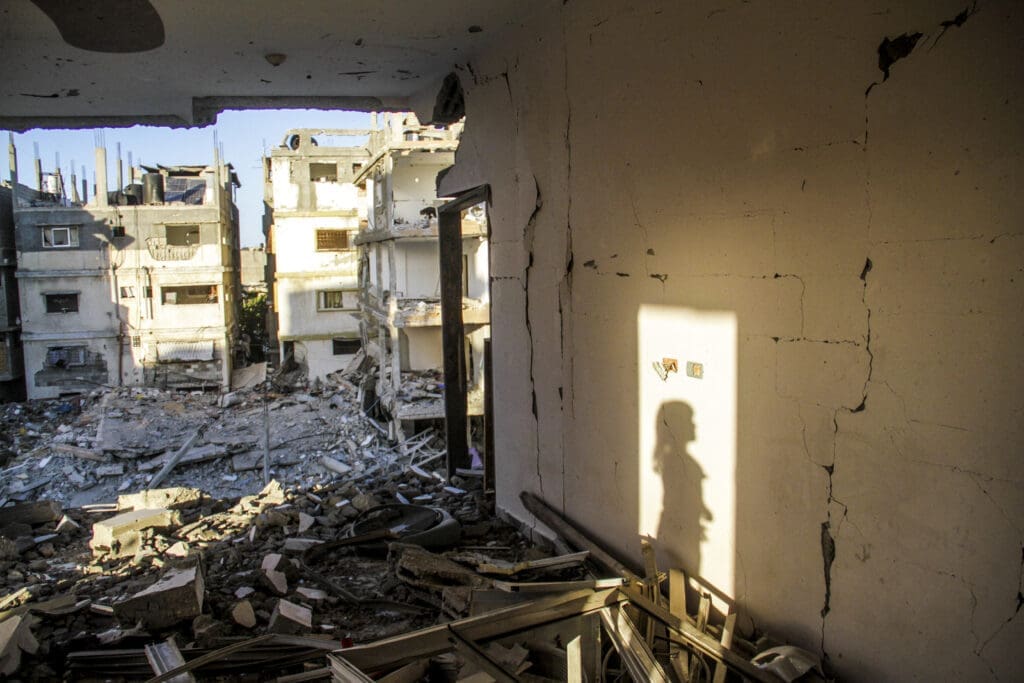When United Nations Security Council (UNSC) resolution 1325 on Women, Peace and Security (WPS) was adopted on October 31, 2000, it marked an unprecedented commitment by the international community to regard women as integral partners in peace processes. The WPS “agenda,” as it came to be known, encompasses ten UNSC resolutions that recognize the devastating impacts of war on women and girls globally, while demanding these groups be fully engaged in conflict resolution and peacebuilding efforts from which they have been historically marginalized.
Despite the many gains made in the Arab world heading into the 24th anniversary of Resolution 1325, the WPS agenda is facing a crisis of legitimacy in the region. For one, there has been a glaring omission of the plight of Palestinian women for years, which has only been exacerbated over the past year of immeasurable suffering in Gaza and the West Bank. The WPS agenda is also undermined by an inability to adapt its concepts and terminologies to local cultures, cementing its perception as a foreign construct.
With conflict surging in the region, there is an urgent need to reevaluate, refine and adapt the WPS agenda to reflect the realities that women in Arab states are facing. Policymakers, activists and scholars in the Arab world must capitalize on existing initiatives and the gains that have been made to drive forward a more focused approach to WPS—one that caters to the region’s specific needs and influences the broader goals of the agenda at the United Nations (UN).
The Role of WPS
The WPS agenda can be credited for formally enhancing women’s representation and participation in peacemaking; shedding light on and offering protection mechanisms to combat gender-based, sexual violence during war time; and pushing states to financially commit to WPS-related initiatives through concrete national action plans (NAPs). Over the past year, there has been progress on some fronts globally, as 108 countries have adopted NAPs in 2024—an uptick from 2023.
Still, problems persist across the board and momentum for implementing the WPS agenda seems to have slowed in recent years. Women’s participation in UN-led or co-led peace processes has declined—from 23% in 2020 to 16% in 2023—and, with the exception of Colombia, women have been largely absent from the negotiation tables. A minority of peace agreements reached in 2022 contained gender provisions (6 out of 18 agreements).
In the Arab world, these failings are even more pronounced, as only 8 regional countries have NAPs. Moreover, the wars in Gaza and Lebanon, which have killed thousands of innocent women and displaced thousands more, are stark indicators of the disconnect between the WPS agenda and the realities on the ground. Even though Palestine and Lebanon put forward NAPs in 2017 and 2019, respectively, the documents now seem hollow in the face of the ongoing conflicts plaguing both nations.
Gains and Progress Made in the Arab Region
Women in conflict-affected states in the Arab region have, since 2011, taken on important mediator roles within their communities. These roles have encompassed negotiating prisoner releases and local truce agreements in Syria, bringing forward crucial issues such as displacement to formal peace negotiations in Libya, and negotiating ceasefire agreements at the local level in Yemen.
Established in 2016, the Syrian Women’s Advisory Board formalized the inclusion of Syrian women in key peace processes. In 2019, women also comprised around 30% of the seats in the Syrian Constitutional Committee—the main body tasked with rewriting the Syrian constitution. In Libya, in 2020, women secured key negotiating roles in the Libyan Political Dialogue Forum and constituted 23% of its negotiators. In Yemen, although the percentage of women delegates in the 2016 Kuwait talks stood at 12% and at a mere 4% in the 2018 Stockholm agreement, and despite severe restrictions placed on them in Houthi-controlled areas, women have been instrumental. Through the Yemeni Women Pact for Peace and Security and other civil society groups, women have supported local efforts to disburse humanitarian aid, release prisoners, reintegrate child soldiers into society and advocate for the inclusion of women in official negotiations.
Local mediation efforts in conflict-prone Arab states are happening in parallel to important capacity-building initiatives. In Lebanon, the Young Women Peacebuilders program offered women from 12 Arab countries an in-depth training in 2023 in conflict prevention, resolution and mediation aimed at enhancing women’s peacebuilding skills. The United Arab Emirates has trained more than 400 women peacekeepers from all over the world since 2019, increasing women cadets’ operational effectiveness and enhancing their peacekeeping and military capabilities.
The formation of the WPS Working Group for Arab States in June 2024—a joint platform between the UN Women Regional Office for Arab States, the WPS Regional Hub in Beirut and other entities based in the region—is the latest initiative bringing together women from different sectors and Arab countries. The aim of the working group is to shape—through advocacy work, research and regular meetings—how the WPS agenda is implemented in the region, advocating for international attention to the realities and experiences of women living in Arab states.
Challenges and Gaps
Despite the gains that have been made, the WPS agenda in the Arab region is suffering from a crisis of legitimacy which, if left unaddressed, will hinder its acceptance and application in the coming years. As the agenda nears its 25th anniversary, it is crucial to recognize the challenges that have plagued WPS-related initiatives and to work towards solving them.
Contributing to the WPS agenda’s crisis of legitimacy in the Arab world is a failure to address the plight of Palestinian women living under occupation. The omission of this issue from WPS texts, resolutions and formal meetings predates the war on Gaza but has become particularly glaring since October 2023. The unique challenges that politically active Palestinian women face, such as harassment, violence and abuse at the hands of the Israeli state, are completely ignored by an agenda that was designed to offer protection mechanisms to all women.
Despite the lack of safety, heavy damages incurred to their headquarters over the past year and significant decreases in funding, Palestinian women-led organizations have continued to operate in Gaza and the West Bank. While the UN estimates that 80 percent of Gazan women now rely on food aid to survive, these organizations and the women who lead them are on the front line, offering emergency relief, distributing food and cash, and providing psychological services to those in need.
Another challenge is the perception among certain regional audiences that WPS concepts pertaining to women’s empowerment and gender equality are Western constructs that are inherently incompatible with local cultures. The technical terminology used in some WPS texts and circles exacerbates this problem in societies where women’s participation in peace and security affairs may not be widely accepted. For example, the WPS Working Group for the Arab States found that Western concepts like “gender mainstreaming” are mostly geared towards women elites. As such, contextualizing the agenda, ideas and terminology to regional audiences beyond elites is crucial to strengthening its acceptance and legitimacy among the broader public.
Two final, major challenges plaguing the WPS agenda are the dwindling of funding and resources and a decrease in the political will to follow through on WPS commitments. Financial and political support are crucial for the effective implementation of WPS initiatives—especially in the Arab world, where only a minority of states, and none since 2021, have formally adopted NAPs for WPS.
With the wars in Gaza and Lebanon still raging, the sustainability of the WPS agenda in the Arab region hangs in the balance. The upcoming 25th anniversary of UNSC Resolution 1325 provides an opportunity to drive the agenda forward. To do so, gaps must be addressed and women living in the Arab world must be represented in official processes and spaces. The WPS agenda, the Arab region and the millions of women living in Arab states will all be better off for it.


